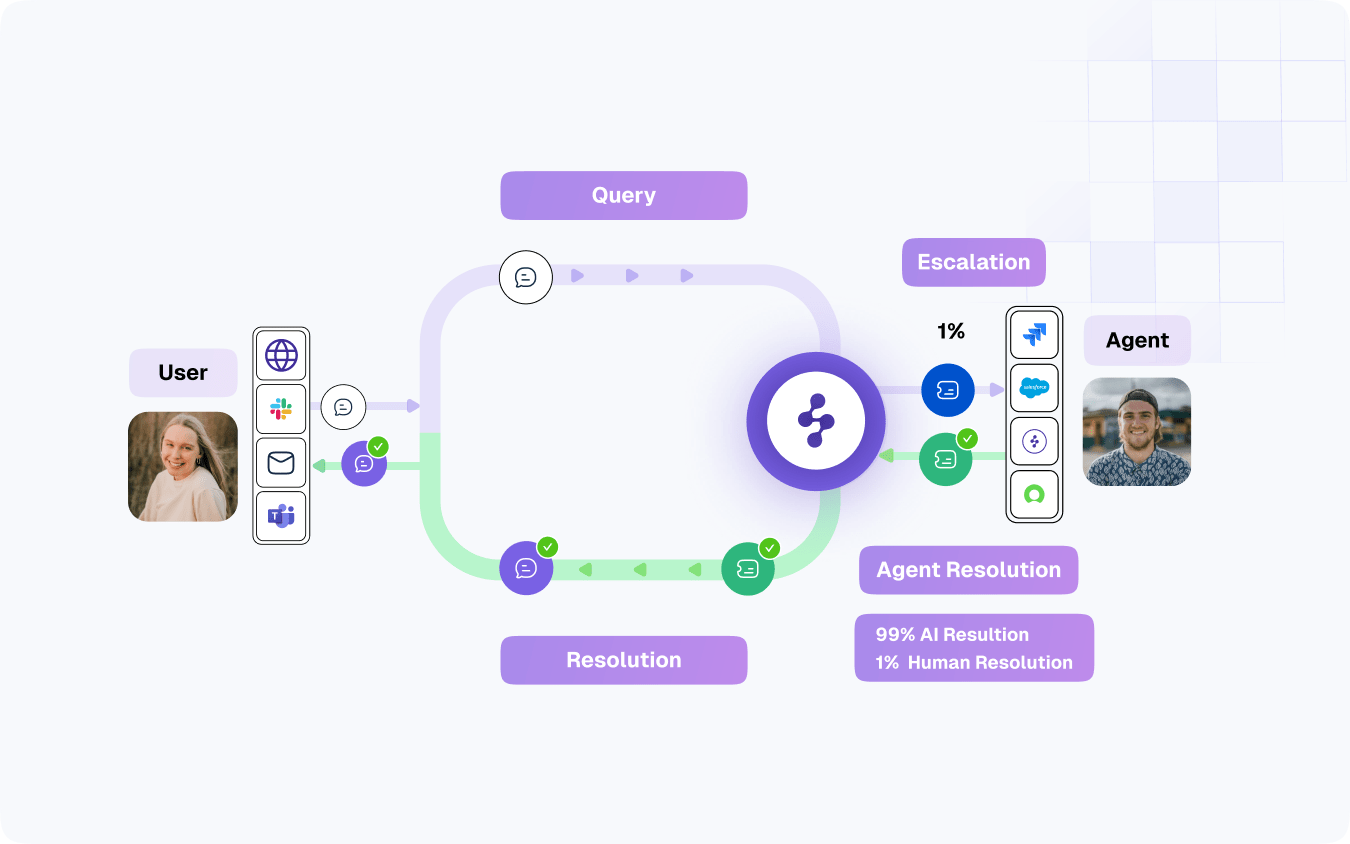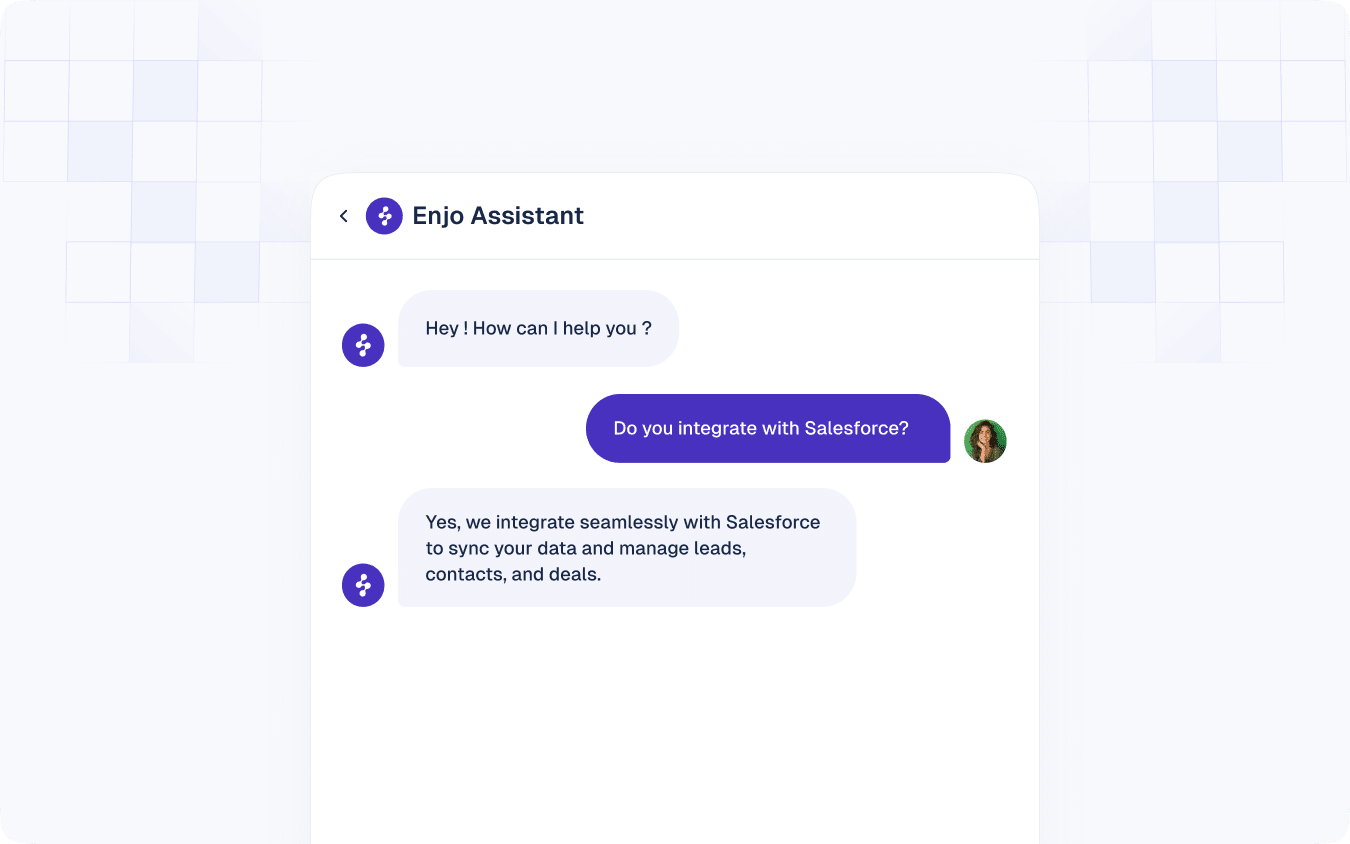What is Customer Service Automation? Beginner’s Guide (2025)
Introduction
Customer expectations are at an all-time high in 2025.They want instant answers, 24/7 availability, and personalized experiences. At the same time, support teams are stretched thin, managing higher ticket volumes, multiple communication channels, and limited budgets.
This is where customer support automation steps in.Instead of relying solely on humans for every repetitive task, automation uses AI, chatbots, and smart workflows to handle common issues. The result? Faster resolutions for customers and more time for agents to focus on the complex problems that really matter.
If you’re new to the concept, this article is designed for you.
We’ll break down:
- What customer service automation actually means (in plain English)
- Why it’s becoming a must-have in 2025
- Simple real-world examples you’ve likely experienced already
- How businesses can start small and scale effectively
Think of this as your beginner-friendly entry point into automation.
If you need the complete playbook, you can always dive into our Definitive Guide to Customer Service Automation.

What is Customer Service Automation?
At its core, customer service automation means using technology to handle support tasks that don’t always need a human agent.
Think about the most common requests your support team faces every day:
- “Where’s my order?”
- “How do I reset my password?”
- “Can you update my billing info?”
Do these require deep problem-solving? Not really. They’re repetitive, routine, and predictable. This is exactly where automation shines.
Instead of agents manually answering these questions, automation systems step in to:
- Detect the intent of the customer’s query (order tracking, account help, IT request)
- Respond instantly through a chatbot,auto-reply with multiple platforms, or help center article
- Route the ticket to the right team if human input is needed
- Escalate complex issues to a live agent only when necessary
The Building Blocks of Automation
To make this less abstract, here’s a simple framework:
- Trigger – A customer takes an action (e.g., opens chat, sends email, submits request in Slack).
- Processing – The system identifies what the customer needs (using rules or AI/NLP).
- Action – An automated response is triggered (FAQ answer, status update, workflow kick-off).
- Escalation – If unresolved, the request is routed to an agent with all context pre-filled.
Without automation, every small issue eats into your team’s time. With automation, 80% of routine queries can be handled instantly, leaving your agents free for the high-value interactions that drive loyalty.
Why Businesses Use Customer Service Automation: 5 Quick Wins
Customer service automation isn’t just a buzzword. Businesses invest in it because it directly solves real, everyday problems that support teams face. Here are the five biggest reasons companies adopt it:
1. Faster Response Times
Nobody likes waiting on hold or refreshing their inbox for a reply.
With automation:
- Chatbots respond instantly to FAQs
- Automated routing ensures tickets reach the right team faster
- Customers feel heard right away, even if a human follows up later
Result: Happier customers, less frustration.
2. Round-the-Clock Availability
Your support team works 9–5 an beyond schedules. The same doesn't apply for your customers.
- A chatbot or knowledge base can answer questions at midnight
- Automated systems keep service running during holidays or peak surges
- Customers can self-serve instead of waiting until business hours
This is especially powerful for global SaaS companies and ecommerce stores.
3. Lower Costs Without Cutting Corners
Hiring more agents isn’t always an option. Automation allows teams to scale without extra headcount.
- A single bot can handle thousands of queries a day
- Agents spend their time on complex issues instead of copy-pasting FAQ answers
- Businesses reduce operational costs while maintaining quality
4. Consistency in Support
Different agents sometimes give different answers. Automation solves that by:
- Pulling answers from a single knowledge base
- Standardizing workflows (billing issues always → billing team, etc.)
- Ensuring every customer gets the same level of service
This builds trust because customers know what to expect.
5. Happier, More Productive Teams
Agents don’t join support to reset passwords all day.
When automation handles repetitive tasks, teams can:
- Focus on problem-solving and relationship-building
- Spend more time learning, less time firefighting
- Feel more engaged, reducing turnover
Quick Reality Check
Most businesses don’t automate everything at once. They start with:
- 1 chatbot to deflect FAQs
- 1 workflow for ticket routing
- 1 automation for status updates
Even these small steps can free up hundreds of hours per year, proving automation’s ROI almost immediately.
Everyday Examples of Customer Service Automation
If you’ve ever chatted with a bot on a website or received an instant email after submitting a ticket, you’ve already seen customer service automation in action. Here are some common ways it shows up across industries:
Chatbots on Websites
- A visitor lands on your SaaS site and asks, “Do you integrate with Salesforce?”
- Instead of waiting for an agent, a chatbot pulls the answer directly from your knowledge base.
- If the visitor wants more, the bot can schedule a demo with sales, no human intervention required.
Why it works: Instant answers build trust and keep prospects moving through the funnel.
Learn more about Enjo AI Customer Service Integrations.
Automated Ticket Routing
- In tools like Jira or Zendesk, every incoming ticket needs to go to the right person.
- Automation ensures billing issues go straight to finance, while technical bugs route to engineering.
- No more manual forwarding, no wasted time.
Impact: Cuts down ticket resolution time and prevents things from “falling through the cracks.”

Fruther reading: Best Conversational Ticketing Systems in 2025
Slack or Microsoft Teams Integrations
- Employees often raise IT or HR requests directly inside Slack/Teams.
- Automation can convert those into tickets instantly, log them in the helpdesk, and even send status updates back into Slack.
Real example: An employee types “/help laptop not working” in Slack → bot creates a ticket in Jira → IT team gets notified instantly.
Knowledge Base Suggestions
- A customer begins typing a support request like “How do I reset my password?”
- Before they hit submit, the system suggests an article that explains the solution.
- Many customers solve the problem themselves — no agent ever gets involved.
Result: Reduced ticket volume, better self-service adoption.
Building the best knowledge-base is at you should be aiming for in your organization. Here's how you can build one through MS Teams.
Post-Support Follow-Ups
- After a ticket closes, automation can trigger a personalized survey email asking, “How did we do?”
- It can also share resources like “Getting Started Guides” for new users, or upsell offers for ecommerce customers.
Why it matters: Keeps the relationship going beyond just “case closed.”
These examples may look simple, but together they transform support. Instead of wasting human talent on repetitive tasks, automation handles the heavy lifting, while agents focus on empathy, problem-solving, and customer loyalty.

How Customer Service Automation Helps Businesses
For beginners, customer service automation may sound like just a time-saver. In reality, its impact goes much deeper. When implemented well, automation can transform the way a business operates, scales, and grows.
Here’s how:
Scale Without Adding More Agents
Every growing company hits the same wall: support tickets rise faster than headcount budgets.
- With automation, you can handle 2x or 3x more requests without doubling your team.
- Simple workflows (like order tracking or password resets) scale effortlessly, no matter how many customers you add.
Example: A SaaS startup automates 30% of its support queries → avoids hiring 2–3 extra agents while still maintaining quality service.
Relevant Reading: An Ultimate Guide to Implementing AI Chatbots

Improve Customer Satisfaction (CSAT/NPS)
Speed is everything in customer service. Customers don’t mind speaking to a bot if they get their answer instantly.
- Shorter wait times = happier customers
- More consistent answers = stronger trust
- Proactive automation (like status updates) prevents frustration before it happens
Result: Better CSAT scores and loyalty without burning out your team.
Reduce Operational Costs
Labor is the single biggest cost in support. Automation doesn’t eliminate humans, it optimizes them.
- One bot can deflect thousands of repetitive queries per month
- Routing rules prevent wasted time bouncing tickets between teams
- Self-service cuts down expensive live chat and phone interactions
Why it matters: Lower cost-per-ticket without compromising service quality.
Enable Growth & Innovation
Automation is a foundation for scaling new initiatives:
- Expanding to new markets? Automation helps you handle multi-language queries.
- Launching a new product? Chatbots can onboard and guide early adopters.
- Adding integrations? Automated workflows can extend across Slack, Jira, or Teams.
This means automation isn’t just about saving money, it’s a growth enabler.
Customer support automation gives businesses a triple advantage:
- Efficiency → faster, cheaper support
- Experience → happier customers and agents
- Scalability → readiness for future growth
It’s no wonder adoption rates have skyrocketed in 2025. For companies of any size, automation is no longer optional.
Getting Started with Customer Service Automation
One of the biggest mistakes companies make is trying to automate everything at once. This usually leads to frustration, broken workflows, and poor customer experiences. The smarter approach is to start small, prove the value, and then scale gradually.
Here’s a simple roadmap you can follow:
Spot the Low-Hanging Fruit
Begin by identifying the most repetitive, high-volume requests your team handles.
- Common examples: password resets, account updates, order tracking, subscription FAQs.
- These usually account for 20–40% of total tickets, making them the best starting point.
Pro tip: Pull a quick report from your helpdesk tool (Zendesk, Jira, Zendesk, etc.) to see the top 10 recurring queries.
Find out the Best Free Customer Service Software to scale from.
Choose the Right First Channel
Pick one place where automation will make the most visible impact.
- Website chatbot → great for capturing prospects and handling FAQs
- Internal chat (Slack/Teams) → perfect for IT/HR ticketing inside large companies
- Helpdesk workflows → best for reducing back-and-forth in ticket routing

Don’t spread yourself too thin. Nail one channel before adding more.
Set Up Simple Automations First
Start with rules-based automation before diving into advanced AI.
- Auto-replies for common questions (“We’ve received your request, here’s a resource to help meanwhile…”)
- Ticket categorization & routing (billing vs technical vs sales)
- Knowledge base suggestions before ticket submission
This phase builds confidence in automation without overwhelming your team.
Measure What Matters
To justify further investment, you’ll need proof. Track:
- Deflection rate → % of tickets resolved without human intervention
- First Response Time (FRT) → how much faster customers hear back
- CSAT/NPS → does automation actually improve satisfaction?
- Agent productivity → fewer tickets per agent, more time on complex cases
These metrics give you a clear ROI story for leadership.
Layer in AI Gradually
Once the basics work smoothly, start adding AI-powered automation:
- Natural Language Processing (NLP) → better at understanding human questions
- Predictive routing → sends tickets to the agent most likely to resolve them fastest
- Generative AI bots → provide conversational, human-like responses
This is where automation moves from “basic efficiency” → “next-level customer experience.”
Keep Humans in the Loop
Even the best AI can’t handle everything. Make sure customers always have a way to:
- Escalate to a live agent when needed
- Give feedback on automated responses
- Feel like they’re in control, not stuck in a bot loop
Golden rule: Automation should support humans, not trap customers.
Further Reading: AI Support Agents vs. Human Agents
Expand and Optimize
Once you’ve proven value in one area, scale automation to others:
- Add more channels (chat, email, voice, social media)
- Introduce proactive automation (shipping updates, renewal reminders)
- Integrate automation into cross-functional workflows (sales, IT, HR)
Treat automation as an ongoing strategy, not a one-time project.
Core Components of Customer Service Automation Platforms
Successful customer support automation platforms combine several essential features to deliver effective and scalable support:
- AI Agent Studio: A no-code or low-code tool that allows support teams to create and customize AI-powered chatbots without needing technical skills. This enables rapid deployment of virtual agents tailored to specific business needs.
- Knowledge Training: Platforms train AI agents on diverse knowledge sources. Such as product manuals, previous support tickets, and FAQs to ensure they provide accurate and relevant answers. This continuous learning helps the AI improve over time.
- Ticketing System Integration: Integrations with popular helpdesk systems like Jira, Zendesk, and ServiceNow are critical. They let AI agents access ticket data, create new requests, update statuses, and escalate issues when human intervention is necessary.
- Automated Actions: Advanced platforms enable AI agents to perform actions beyond answering questions, such as resetting passwords, updating customer records, or triggering workflows inside business applications.
- Multichannel Deployment: To meet customers wherever they are, automation platforms support deployment across multiple communication channels, including web chat widgets, Slack, Teams, and email offering a seamless support experience.
- Collaboration Features: Tools like shared inboxes and Swarm Rooms allow human agents to monitor and collaborate on AI-handled conversations, ensuring smooth handoffs and maintaining support quality.

Overcoming Common Challenges in Customer Service Automation
While customer service automation offers clear benefits, enterprises often face challenges during implementation:
- Data Integration: Combining data from multiple sources, such as ticketing systems, product documentation, and knowledge bases, can be complex but is crucial for effective AI training.
- Quality of Training Data: Poorly curated or outdated knowledge can lead to inaccurate AI responses, undermining customer trust.
- Employee Adoption: Gaining support from human agents is essential. Agents must trust AI tools as collaborators rather than competitors.
- Maintaining Human Touch: It’s important to balance automation with personalized human interactions, especially for sensitive or complex cases.
- Security and Compliance: Automation platforms must ensure data privacy and comply with industry regulations, particularly when accessing sensitive customer information.
- Continuous Improvement: AI models require ongoing monitoring and refinement to stay effective as products and customer needs evolve.
Read more on: Benefits and Challenges of Customer Service Automation
Addressing these challenges with a strategic approach and the right technology partner ensures a smooth transition to automated support and maximizes its value.
Conclusion: Start Small, Grow Big
Customer service automation isn’t just a trend in 2025, it’s quickly becoming the baseline for how modern businesses deliver support. Whether it’s a chatbot on your website, an automated ticket workflow, or proactive updates sent to customers, automation is no longer a “nice to have.” It’s the engine that allows teams to scale support without sacrificing quality.
The key is to start small:
- Identify your most repetitive support requests.
- Introduce automation in one channel.
- Measure the impact, then expand gradually.
You don’t need to replace your support team. Instead, think of automation as a force multiplier, one that frees agents from repetitive tasks and empowers them to focus on the complex, high-value interactions that build loyalty.
👉 If you’re ready to take the next step:
- See automation in action with an Enjo demo. In just a few minutes, you’ll understand how Enjo can help your team deliver faster, smarter, and more human support.
- Learn how to setup your first AI Website Chatbot today.
Key Takeaways
- Customer service automation = technology handling repetitive support tasks.
- Benefits: faster responses, 24/7 availability, lower costs, happier teams.
- Common examples: chatbots, ticket routing, Slack/Teams integrations, proactive updates.
- Getting started = focus on one channel, simple workflows, and measurable impact.
- Automation isn’t about replacing humans, it’s about letting humans do the work that matters most.

Explore how Enjo AI can make your collaboration environment more efficient, personalized, and proactive. Contact us today to schedule a free demo.
FAQ
What are the Customer Service Expectations for 2025?
In 2025, customers expect fast, personalized, and proactive support across channels. Enjo’s AI-driven automation, predictive analytics, and seamless integrations empower businesses to deliver efficient, human-AI balanced service that meets these demands.
Will AI replace Customer Support?
AI won’t replace customer support but will transform it into a powerful human-AI partnership. Enjo’s AI agents handle routine tasks like FAQs and order tracking with seamless integrations into tools like Slack and Jira, resolving up to 70% of inquiries autonomously. This frees human agents to focus on complex issues requiring empathy and creativity. By 2030, AI is expected to manage most routine interactions, but human touch will remain vital for nuanced support, ensuring personalized and effective customer experiences.
What is the future of Customer Experience?
Customer experience (CX) in 2030 will be seamless, proactive, and personalized across all touchpoints. Enjo’s AI agents, integrated with platforms like Slack and Jira, enable businesses to predict needs and deliver tailored solutions in real-time. By leveraging predictive analytics and automation, companies will shift from reactive support to proactive engagement, resolving issues before customers ask.

What is Customer Service Automation?
At its core, customer service automation means using technology to handle support tasks that don’t always need a human agent.
Think about the most common requests your support team faces every day:
- “Where’s my order?”
- “How do I reset my password?”
- “Can you update my billing info?”
Do these require deep problem-solving? Not really. They’re repetitive, routine, and predictable. This is exactly where automation shines.
Instead of agents manually answering these questions, automation systems step in to:
- Detect the intent of the customer’s query (order tracking, account help, IT request)
- Respond instantly through a chatbot,auto-reply with multiple platforms, or help center article
- Route the ticket to the right team if human input is needed
- Escalate complex issues to a live agent only when necessary
The Building Blocks of Automation
To make this less abstract, here’s a simple framework:
- Trigger – A customer takes an action (e.g., opens chat, sends email, submits request in Slack).
- Processing – The system identifies what the customer needs (using rules or AI/NLP).
- Action – An automated response is triggered (FAQ answer, status update, workflow kick-off).
- Escalation – If unresolved, the request is routed to an agent with all context pre-filled.
Without automation, every small issue eats into your team’s time. With automation, 80% of routine queries can be handled instantly, leaving your agents free for the high-value interactions that drive loyalty.
Why Businesses Use Customer Service Automation: 5 Quick Wins
Customer service automation isn’t just a buzzword. Businesses invest in it because it directly solves real, everyday problems that support teams face. Here are the five biggest reasons companies adopt it:
1. Faster Response Times
Nobody likes waiting on hold or refreshing their inbox for a reply.
With automation:
- Chatbots respond instantly to FAQs
- Automated routing ensures tickets reach the right team faster
- Customers feel heard right away, even if a human follows up later
Result: Happier customers, less frustration.
2. Round-the-Clock Availability
Your support team works 9–5 an beyond schedules. The same doesn't apply for your customers.
- A chatbot or knowledge base can answer questions at midnight
- Automated systems keep service running during holidays or peak surges
- Customers can self-serve instead of waiting until business hours
This is especially powerful for global SaaS companies and ecommerce stores.
3. Lower Costs Without Cutting Corners
Hiring more agents isn’t always an option. Automation allows teams to scale without extra headcount.
- A single bot can handle thousands of queries a day
- Agents spend their time on complex issues instead of copy-pasting FAQ answers
- Businesses reduce operational costs while maintaining quality
4. Consistency in Support
Different agents sometimes give different answers. Automation solves that by:
- Pulling answers from a single knowledge base
- Standardizing workflows (billing issues always → billing team, etc.)
- Ensuring every customer gets the same level of service
This builds trust because customers know what to expect.
5. Happier, More Productive Teams
Agents don’t join support to reset passwords all day.
When automation handles repetitive tasks, teams can:
- Focus on problem-solving and relationship-building
- Spend more time learning, less time firefighting
- Feel more engaged, reducing turnover
Quick Reality Check
Most businesses don’t automate everything at once. They start with:
- 1 chatbot to deflect FAQs
- 1 workflow for ticket routing
- 1 automation for status updates
Even these small steps can free up hundreds of hours per year, proving automation’s ROI almost immediately.
Everyday Examples of Customer Service Automation
If you’ve ever chatted with a bot on a website or received an instant email after submitting a ticket, you’ve already seen customer service automation in action. Here are some common ways it shows up across industries:
Chatbots on Websites
- A visitor lands on your SaaS site and asks, “Do you integrate with Salesforce?”
- Instead of waiting for an agent, a chatbot pulls the answer directly from your knowledge base.
- If the visitor wants more, the bot can schedule a demo with sales, no human intervention required.
Why it works: Instant answers build trust and keep prospects moving through the funnel.
Learn more about Enjo AI Customer Service Integrations.
Automated Ticket Routing
- In tools like Jira or Zendesk, every incoming ticket needs to go to the right person.
- Automation ensures billing issues go straight to finance, while technical bugs route to engineering.
- No more manual forwarding, no wasted time.
Impact: Cuts down ticket resolution time and prevents things from “falling through the cracks.”

Fruther reading: Best Conversational Ticketing Systems in 2025
Slack or Microsoft Teams Integrations
- Employees often raise IT or HR requests directly inside Slack/Teams.
- Automation can convert those into tickets instantly, log them in the helpdesk, and even send status updates back into Slack.
Real example: An employee types “/help laptop not working” in Slack → bot creates a ticket in Jira → IT team gets notified instantly.
Knowledge Base Suggestions
- A customer begins typing a support request like “How do I reset my password?”
- Before they hit submit, the system suggests an article that explains the solution.
- Many customers solve the problem themselves — no agent ever gets involved.
Result: Reduced ticket volume, better self-service adoption.
Building the best knowledge-base is at you should be aiming for in your organization. Here's how you can build one through MS Teams.
Post-Support Follow-Ups
- After a ticket closes, automation can trigger a personalized survey email asking, “How did we do?”
- It can also share resources like “Getting Started Guides” for new users, or upsell offers for ecommerce customers.
Why it matters: Keeps the relationship going beyond just “case closed.”
These examples may look simple, but together they transform support. Instead of wasting human talent on repetitive tasks, automation handles the heavy lifting, while agents focus on empathy, problem-solving, and customer loyalty.

How Customer Service Automation Helps Businesses
For beginners, customer service automation may sound like just a time-saver. In reality, its impact goes much deeper. When implemented well, automation can transform the way a business operates, scales, and grows.
Here’s how:
Scale Without Adding More Agents
Every growing company hits the same wall: support tickets rise faster than headcount budgets.
- With automation, you can handle 2x or 3x more requests without doubling your team.
- Simple workflows (like order tracking or password resets) scale effortlessly, no matter how many customers you add.
Example: A SaaS startup automates 30% of its support queries → avoids hiring 2–3 extra agents while still maintaining quality service.
Relevant Reading: An Ultimate Guide to Implementing AI Chatbots

Improve Customer Satisfaction (CSAT/NPS)
Speed is everything in customer service. Customers don’t mind speaking to a bot if they get their answer instantly.
- Shorter wait times = happier customers
- More consistent answers = stronger trust
- Proactive automation (like status updates) prevents frustration before it happens
Result: Better CSAT scores and loyalty without burning out your team.
Reduce Operational Costs
Labor is the single biggest cost in support. Automation doesn’t eliminate humans, it optimizes them.
- One bot can deflect thousands of repetitive queries per month
- Routing rules prevent wasted time bouncing tickets between teams
- Self-service cuts down expensive live chat and phone interactions
Why it matters: Lower cost-per-ticket without compromising service quality.
Enable Growth & Innovation
Automation is a foundation for scaling new initiatives:
- Expanding to new markets? Automation helps you handle multi-language queries.
- Launching a new product? Chatbots can onboard and guide early adopters.
- Adding integrations? Automated workflows can extend across Slack, Jira, or Teams.
This means automation isn’t just about saving money, it’s a growth enabler.
Customer support automation gives businesses a triple advantage:
- Efficiency → faster, cheaper support
- Experience → happier customers and agents
- Scalability → readiness for future growth
It’s no wonder adoption rates have skyrocketed in 2025. For companies of any size, automation is no longer optional.
Getting Started with Customer Service Automation
One of the biggest mistakes companies make is trying to automate everything at once. This usually leads to frustration, broken workflows, and poor customer experiences. The smarter approach is to start small, prove the value, and then scale gradually.
Here’s a simple roadmap you can follow:
Spot the Low-Hanging Fruit
Begin by identifying the most repetitive, high-volume requests your team handles.
- Common examples: password resets, account updates, order tracking, subscription FAQs.
- These usually account for 20–40% of total tickets, making them the best starting point.
Pro tip: Pull a quick report from your helpdesk tool (Zendesk, Jira, Zendesk, etc.) to see the top 10 recurring queries.
Find out the Best Free Customer Service Software to scale from.
Choose the Right First Channel
Pick one place where automation will make the most visible impact.
- Website chatbot → great for capturing prospects and handling FAQs
- Internal chat (Slack/Teams) → perfect for IT/HR ticketing inside large companies
- Helpdesk workflows → best for reducing back-and-forth in ticket routing

Don’t spread yourself too thin. Nail one channel before adding more.
Set Up Simple Automations First
Start with rules-based automation before diving into advanced AI.
- Auto-replies for common questions (“We’ve received your request, here’s a resource to help meanwhile…”)
- Ticket categorization & routing (billing vs technical vs sales)
- Knowledge base suggestions before ticket submission
This phase builds confidence in automation without overwhelming your team.
Measure What Matters
To justify further investment, you’ll need proof. Track:
- Deflection rate → % of tickets resolved without human intervention
- First Response Time (FRT) → how much faster customers hear back
- CSAT/NPS → does automation actually improve satisfaction?
- Agent productivity → fewer tickets per agent, more time on complex cases
These metrics give you a clear ROI story for leadership.
Layer in AI Gradually
Once the basics work smoothly, start adding AI-powered automation:
- Natural Language Processing (NLP) → better at understanding human questions
- Predictive routing → sends tickets to the agent most likely to resolve them fastest
- Generative AI bots → provide conversational, human-like responses
This is where automation moves from “basic efficiency” → “next-level customer experience.”
Keep Humans in the Loop
Even the best AI can’t handle everything. Make sure customers always have a way to:
- Escalate to a live agent when needed
- Give feedback on automated responses
- Feel like they’re in control, not stuck in a bot loop
Golden rule: Automation should support humans, not trap customers.
Further Reading: AI Support Agents vs. Human Agents
Expand and Optimize
Once you’ve proven value in one area, scale automation to others:
- Add more channels (chat, email, voice, social media)
- Introduce proactive automation (shipping updates, renewal reminders)
- Integrate automation into cross-functional workflows (sales, IT, HR)
Treat automation as an ongoing strategy, not a one-time project.
Core Components of Customer Service Automation Platforms
Successful customer support automation platforms combine several essential features to deliver effective and scalable support:
- AI Agent Studio: A no-code or low-code tool that allows support teams to create and customize AI-powered chatbots without needing technical skills. This enables rapid deployment of virtual agents tailored to specific business needs.
- Knowledge Training: Platforms train AI agents on diverse knowledge sources. Such as product manuals, previous support tickets, and FAQs to ensure they provide accurate and relevant answers. This continuous learning helps the AI improve over time.
- Ticketing System Integration: Integrations with popular helpdesk systems like Jira, Zendesk, and ServiceNow are critical. They let AI agents access ticket data, create new requests, update statuses, and escalate issues when human intervention is necessary.
- Automated Actions: Advanced platforms enable AI agents to perform actions beyond answering questions, such as resetting passwords, updating customer records, or triggering workflows inside business applications.
- Multichannel Deployment: To meet customers wherever they are, automation platforms support deployment across multiple communication channels, including web chat widgets, Slack, Teams, and email offering a seamless support experience.
- Collaboration Features: Tools like shared inboxes and Swarm Rooms allow human agents to monitor and collaborate on AI-handled conversations, ensuring smooth handoffs and maintaining support quality.

Overcoming Common Challenges in Customer Service Automation
While customer service automation offers clear benefits, enterprises often face challenges during implementation:
- Data Integration: Combining data from multiple sources, such as ticketing systems, product documentation, and knowledge bases, can be complex but is crucial for effective AI training.
- Quality of Training Data: Poorly curated or outdated knowledge can lead to inaccurate AI responses, undermining customer trust.
- Employee Adoption: Gaining support from human agents is essential. Agents must trust AI tools as collaborators rather than competitors.
- Maintaining Human Touch: It’s important to balance automation with personalized human interactions, especially for sensitive or complex cases.
- Security and Compliance: Automation platforms must ensure data privacy and comply with industry regulations, particularly when accessing sensitive customer information.
- Continuous Improvement: AI models require ongoing monitoring and refinement to stay effective as products and customer needs evolve.
Read more on: Benefits and Challenges of Customer Service Automation
Addressing these challenges with a strategic approach and the right technology partner ensures a smooth transition to automated support and maximizes its value.
Conclusion: Start Small, Grow Big
Customer service automation isn’t just a trend in 2025, it’s quickly becoming the baseline for how modern businesses deliver support. Whether it’s a chatbot on your website, an automated ticket workflow, or proactive updates sent to customers, automation is no longer a “nice to have.” It’s the engine that allows teams to scale support without sacrificing quality.
The key is to start small:
- Identify your most repetitive support requests.
- Introduce automation in one channel.
- Measure the impact, then expand gradually.
You don’t need to replace your support team. Instead, think of automation as a force multiplier, one that frees agents from repetitive tasks and empowers them to focus on the complex, high-value interactions that build loyalty.
👉 If you’re ready to take the next step:
- See automation in action with an Enjo demo. In just a few minutes, you’ll understand how Enjo can help your team deliver faster, smarter, and more human support.
- Learn how to setup your first AI Website Chatbot today.
Key Takeaways
- Customer service automation = technology handling repetitive support tasks.
- Benefits: faster responses, 24/7 availability, lower costs, happier teams.
- Common examples: chatbots, ticket routing, Slack/Teams integrations, proactive updates.
- Getting started = focus on one channel, simple workflows, and measurable impact.
- Automation isn’t about replacing humans, it’s about letting humans do the work that matters most.

Explore how Enjo AI can make your collaboration environment more efficient, personalized, and proactive. Contact us today to schedule a free demo.
FAQ
What are the Customer Service Expectations for 2025?
In 2025, customers expect fast, personalized, and proactive support across channels. Enjo’s AI-driven automation, predictive analytics, and seamless integrations empower businesses to deliver efficient, human-AI balanced service that meets these demands.
Will AI replace Customer Support?
AI won’t replace customer support but will transform it into a powerful human-AI partnership. Enjo’s AI agents handle routine tasks like FAQs and order tracking with seamless integrations into tools like Slack and Jira, resolving up to 70% of inquiries autonomously. This frees human agents to focus on complex issues requiring empathy and creativity. By 2030, AI is expected to manage most routine interactions, but human touch will remain vital for nuanced support, ensuring personalized and effective customer experiences.
What is the future of Customer Experience?
Customer experience (CX) in 2030 will be seamless, proactive, and personalized across all touchpoints. Enjo’s AI agents, integrated with platforms like Slack and Jira, enable businesses to predict needs and deliver tailored solutions in real-time. By leveraging predictive analytics and automation, companies will shift from reactive support to proactive engagement, resolving issues before customers ask.


Accelerate support with Generative AI


Stay Informed and Inspired














